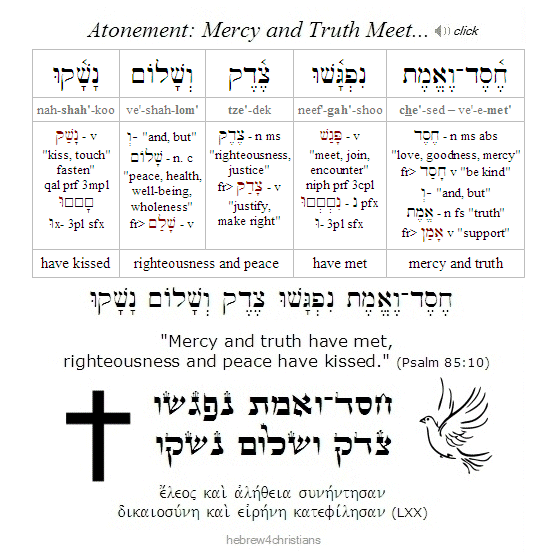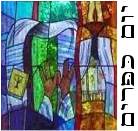|
The Kotzker Rebbe once said, "The prohibition against making idols includes the prohibition against making idols out of the commandments. We should never imagine that the whole purpose of the Torah is its outer form, but rather the inward meaning." Indeed, sacrificial blood was placed over the tablets of the law (i.e., the blood sprinkled on the kapporet, or the "crown" of the Ark) that represented God's forgiveness and atonement for sin. The life is "in the blood," which represents God's passion, the deepest truth of Torah. And this is the message of the gospel itself, of course, since the blood of Yeshua passionately shed for our sake has opened up a new and everlasting way for us to be rightly related to God (Heb. 9:12). As C.S. Lewis fictionally portrayed in the Chronicles of Narnia, after Aslan was slain on the Stone Table, it broke in two "from end to end," symbolizing the deeper Torah of God's love had rightfully satisfied the Torah of His justice.
חֶסֶד־וֶאֱמֶת נִפְגָּשׁוּ
צֶדֶק וְשָׁלוֹם נָשָׁקוּ
che'·sed · ve·e·met · neef·gah'·shoo
tze'·dek · ve·shah·lohm · nah·shah'·koo

"Love and truth have met,
righteousness and peace have kissed."
(Psalm 85:10)


Man prays to God, but to whom does God pray? For what does He pray? Or do you think that the Almighty has no desires of His own, no yearning of heart? The sages of the Talmud believed that God indeed addresses himself: Yehi ratzon milfanai, "May it be acceptable before me, may it be My will, that my compassion overcome my anger, and that it may prevail over my justice when my children appeal to me, so that I may deal with them in mercy and in love" (Berachot 6a). This is the deeper unity of the Name YHVH (יהוה), the Savior and LORD, revealed to Moses after the sin of the Golden Calf (Exod. 34:6-7), and this is the essential meaning of the cross of Yeshua, where the LORD passionately "prayed within Himself" so that His compassion would overcome His fearful judgment for our sins.
Only the cross allows God's righteousness and mercy to "kiss" (Psalm 85:10; 89:14); only the cross reveals the true Holy of Holies where the blood was placed over the Ark of the Law; only the cross intimates the Inner Sanctum of God's heart. Because of the cross, a holy God is able to truly love and help the trusting sinner (Rom. 3:26). It is written: "Righteousness and justice are the foundation of your throne (צֶדֶק וּמִשְׁפָּט מְכוֹן כִּסְאֶךָ); steadfast love and faithfulness go before you" (Psalm 89:14). Because of Yeshua, God is vindicated as entirely just - and the Justifier of those who trust in His redemptive love (Rom. 3:24-26). Yeshua is the prayer of God the Father's on behalf of His children...
The will of God - His heart's yearning and desire - is for his children to receive his love (2 Pet. 3:9; 1 Tim. 2:4; John 3:16; Ezek. 18:23). As Yeshua prayed, "Holy Father, keep them in your Name, which you have given me, that they may be one, even as we are one... I in them and you in me, that they may become perfectly one, so that the world may know that you sent me and loved them even as you loved me" (John 17:11,23). Yeshua died on the cross to bear the shame for your sins, to be sure, but he did this so that you could be accepted and securely loved forever.... It is the love of God that is the goal of all things, after all. When Yeshua cried out, "It is finished" and breathed his last breath as He died for our sins upon the cross, the greatest exhalation of the Spirit occurred, the greatest sigh, the greatest utterance was ever declared. The sacrificial death of Yeshua for our deliverance was God's final word of love breathed out to those who are trusting in Him.
|




